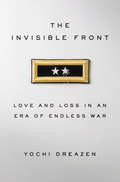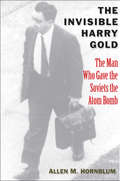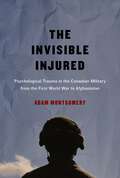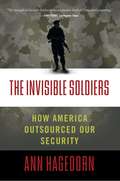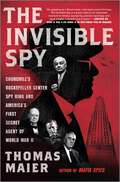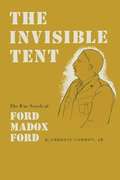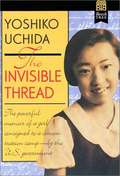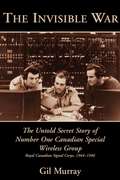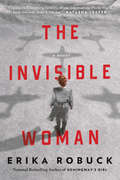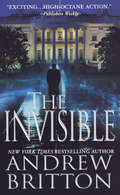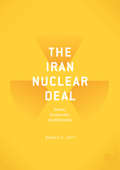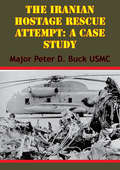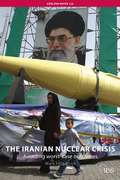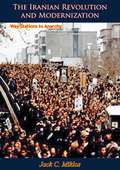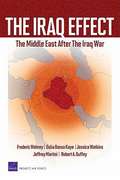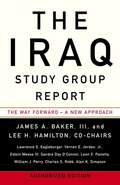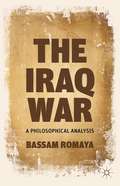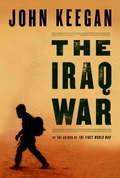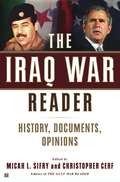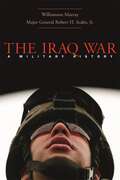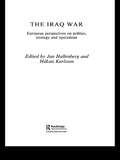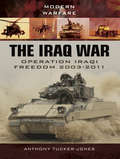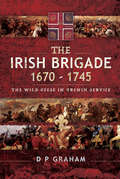- Table View
- List View
The Invisible Front: Love and Loss in an Era of Endless War
by Yochi DreazenThe unforgettable story of a military family that lost two sons—one to suicide and one in combat—and channeled their grief into fighting the armed forces’ suicide epidemic. <P> Major General Mark Graham was a decorated two-star officer whose integrity and patriotism inspired his sons, Jeff and Kevin, to pursue military careers of their own. His wife Carol was a teacher who held the family together while Mark's career took them to bases around the world. When Kevin and Jeff die within nine months of each other—Kevin commits suicide and Jeff is killed by a roadside bomb in Iraq—Mark and Carol are astonished by the drastically different responses their sons’ deaths receive from the Army. While Jeff is lauded as a hero, Kevin’s death is met with silence, evidence of the terrible stigma that surrounds suicide and mental illness in the military. Convinced that their sons died fighting different battles, Mark and Carol commit themselves to transforming the institution that is the cornerstone of their lives.<P> <i>The Invisible Front</i> is the story of how one family tries to set aside their grief and find purpose in almost unimaginable loss. The Grahams work to change how the Army treats those with PTSD and to erase the stigma that prevents suicidal troops from getting the help they need before making the darkest of choices. Their fight offers a window into the military’s institutional shortcomings and its resistance to change – failures that have allowed more than 2,000 troops to take their own lives since 2001. Yochi Dreazen, an award-winning journalist who has covered the military since 2003, has been granted remarkable access to the Graham family and tells their story in the full context of two of America’s longest wars. Dreazen places Mark and Carol’s personal journey, which begins when they fall in love in college and continues through the end of Mark's thirty-four year career in the Army, against the backdrop of the military’s ongoing suicide spike, which shows no signs of slowing. With great sympathy and profound insight, <i>The Invisible Front</i> details America's problematic treatment of the troops who return from war far different than when they'd left and uses the Graham family’s work as a new way of understanding the human cost of war and its lingering effects off the battlefield.
The Invisible Harry Gold
by Allen M. HornblumIn the history of Soviet espionage in America, few people figure more crucially than Harry Gold. A Russian Jewish immigrant who spied for the Soviets from 1935 until 1950, Gold was an accomplished industrial and military espionage agent. He was assigned to be physicist Klaus Fuchs's "handler" and ultimately conveyed sheaves of stolen information about the Manhattan Project from Los Alamos to Russian agents. He is literally the man who gave the USSR the plans for the atom bomb. The subject of the most intensive public manhunt in the history of the FBI, Gold was arrested in May 1950. His confession revealed scores of contacts, and his testimony in the trial of the Rosenbergs proved pivotal. Yet among his co-workers, fellow prisoners at Lewisburg Penitentiary, and even those in the FBI, Gold earned respect, admiration, and affection. InThe Invisible Harry Gold, journalist and historian Allen Hornblum paints a surprising portrait of this notorious yet unknown figure. Through interviews with many individuals who knew Gold and years of research into primary documents, Hornblum has produced a gripping account of how a fundamentally decent and well-intentioned man helped commit the greatest scientific theft of the twentieth century.
The Invisible Injured: Psychological Trauma in the Canadian Military from the First World War to Afghanistan (McGill-Queen's/AMS Healthcare Studies in the History of Medicine, Health, and Society #46)
by Adam MontgomeryThe Canadian military&’s battle with soldiers&’ psychological trauma.
The Invisible Soldiers: How America Outsourced Our Security
by Ann HagedornThe urgent truth about the privatization of America's national security that exposes where this industry came from, how it operates, where it's heading--and why we should be concerned.Thirty years ago there were no private military and security companies (PMSCs); there were only mercenaries. Now the PMSCs are a bona-fide industry, an indispensable part of American foreign and military policy. PMSCs assist US forces in combat operations and replace them after the military withdraws from combat zones; they guard our embassies; they play key roles in US counterterrorism strategies; and Homeland Security depends on them. Their services include maritime security, police training, drone operations, cyber security, and intelligence analysis (as Edward Snowden has famously revealed). Even the United Nations employs them.When did this happen? The turning point came when the US found itself in a prolonged war with Iraq, but without adequate forces. So the Bush Administration turned to the PMSCs to fill the gap. Private contractors and subcontractors eventually exceeded the traditional troops. The industry has never scaled back. Ann Hagedorn profiles the members of Congress who recognize the dangers of dependence on PMSCs, but have been unable to limit them or even determine their true scope. She takes us to the exclusive club in London where the PMSCs were created, and she reveals the key figure in the evolution of the industry. She introduces us to a US Army general who studies new developments, such as PMSCs' drone operations, and worries about PMSCs potentially fighting American troops. The Invisible Soldiers will inspire a national dialogue about a little-known international industry on which our security rests.
The Invisible Spy: Churchill's Rockefeller Center Spy Ring and America’s First Secret Agent of World War II
by Thomas MaierThe untold WWII story of a former NFL player turned White House insider who worked with Churchill&’s undercover agents in New York City to conduct the biggest foreign spy operation ever within the US, and inspired Ian Fleming's James Bond, for fans of Ben Macintyre and Erik Larson.As a tough but smart Italian American kid, Ernest Cuneo played Ivy League football at Columbia University and was in the old Brooklyn Dodgers NFL franchise before becoming a city hall lawyer and &“Brain Trust'' aide to President Roosevelt. He was on the payroll of national radio columnist Walter Winchell and mingled with the famous and powerful. But his status as a spy remained a secret, hiding in plain sight.During this time, Cuneo began a close friendship with British spy Ian Fleming and helped inspire Fleming's James Bond novels. He also began a love affair with one of Churchill's agents at Rockefeller Center—Margaret Watson, a beautiful Canadian woman with a photographic memory ideal for spycraft. In one nighttime attack, Watson was nearly smothered to death by a Nazi assassin inside her women&’s dormitory near Rockefeller Center. Cuneo&’s transformation from a gridiron athlete into a high-stakes intelligence go-between and political influencer is one of the great untold stories of American espionage. He has remained &“invisible&” in the public eye—until now, with this unveiled look into his life.From the bestselling author and producer of two hit TV series, Mafia Spies and Masters of Sex, Thomas Maier delves into the little-known tales behind the Rockefeller Center spy operation and the origins of American intelligence. The Invisible Spy weaves Cuneo&’s remarkable personal story with vivid insights about many top twentieth-century figures, including Churchill, FDR and later JFK. Full of action and fascinating characters, this untold history reveals how Cuneo, as America's first WWII spy, helped the British launch a covert campaign against Nazi conspirators hidden in America, an espionage war unbeknownst to many.
The Invisible Tent: The War Novels of Ford Madox Ford
by Ambrose Gordon Jr.This critical evaluation of Ford Madox Ford's "novels of war, which are also novels about peace," is made in a most delightful manner. Based on a thorough knowledge of the novelist, it is enriched by keen perception and delicate taste and is couched in an informal, highly readable style. Ambrose Gordon, Jr. , here analyzes seven novels by Ford that in Gordon's opinion constitute Ford's masterpieces: Parade's End (a tetralogy consisting of Some Do Not, No More Parades, A Man Could Stand Up, and The Last Post), The Marsden Case, No Enemy, and The Good Soldier. Interested in what these novels have to say, Gordon is equally interested in how they make their comment, and so approaches them through analysis of the fictional methods that Ford employed. Yet he skillfully avoids a common error of critics who become absorbed in technique-loss of contact with the book itself-by providing numerous quotations of sufficient length to indicate the novels' quality. These passages, examined in detail for content and technique, give the reader an understanding of the novel that, though not a substitute for one's own reading of the narratives, is enhanced by the interpretation of a brilliant critic. Gordon traces the development of the novelist's art in various phases: the characteristic moods and general patterns of his novels, his borrowings from the French, the effects of his association with Conrad, his concept of the novel as fairy tale, his use of scene exteriors and interiors. Gordon's discussion cuts across the seven novels in many aspects but concentrates on one novel, or a group of novels, when his ideas have less general illustration.
The Invisible Thread: An Autobiography
by Yoshiko UchidaGrowing up in California, Yoshi knew her family looked different from their neighbors. Still, she felt like an American. But everything changed when America went to war against Japan. Along with all the other Japanese-Americans on the West Coast, Yoshi's family were rounded up and imprisoned in a crowded. badly built camp in the desert because they "looked like the enemy." Yoshiko Uchida grew up to be an award-winning author. This memoir of her childhood gives a personal account of a shameful episode in American history.
The Invisible War: The Untold Secret Story of Number One Canadian Special Wireless Group
by Gil MurrayWhile the Second World War raged in Europe, demanding most of Canada’s military effort, an equally fierce war with Japan was going on in the Far East. Army, navy, and air force signals units in Canada kept watch on the enemy’s vital radio communications. To be more effective, Number One Canadian Special Wireless Group of the Royal Canadian Signals Corps was formed to go to the Southwest Pacific war theatre for close-in radio eavesdropping. Murray describes the often zany career of the only complete signals unit Canada sent to the War in the Pacific, and the significant part it played in the Allied signals intelligence operation known as "Magic."
The Invisible Woman
by Erika Robuck&“An extraordinary profile of immense courage and daring.&”—Chanel Cleeton, New York Times bestselling author of Before We Left Cuba &“If you only read one WWII book this year, make it this one."—Natasha Lester, New York Times bestselling author of The Paris Orphans In the depths of war, she would defy the odds to help liberate a nation…a gripping historical novel based on the remarkable true story of World War II heroine Virginia Hall, from the bestselling author of Hemingway&’s Girl France, March 1944. Virginia Hall wasn't like the other young society women back home in Baltimore—she never wanted the debutante ball or silk gloves. Instead, she traded a safe life for adventure in Europe, and when her beloved second home is thrust into the dark days of war, she leaps in headfirst.Once she's recruited as an Allied spy, subverting the Nazis becomes her calling. But even the most cunning agent can be bested, and in wartime trusting the wrong person can prove fatal. Virginia is haunted every day by the betrayal that ravaged her first operation, and will do everything in her power to avenge the brave people she lost.While her future is anything but certain, this time more than ever Virginia knows that failure is not an option. Especially when she discovers what—and whom—she's truly protecting.
The Invisible: The American; The Assassin; The Invisible; The Exile (A\ryan Kealey Thriller Ser. #3)
by Andrew BrittonTensions between Pakistan and India are at an all-time high. To complicate matters, twelve American climbers have disappeared in Pakistan's Hindu Kush range. As the conflict escalates, the U.S. Secretary of State's motorcade is ambushed on the outskirts of Islamabad. When her back-up team arrives, they discover a disastrous scene: dozens are dead, including seven diplomatic security agents, and the secretary of state has vanished without a trace.In the wake of the unprecedented attack, CIA agent Ryan Kealey's operation goes into high gear. Naomi Kharmai, the British-born analyst who has taken on a daring new role with the Agency, is on his team again. But Kharmai is becoming increasingly unpredictable, and as they work their way toward the target, it becomes clear to Kealey that anyone is fair game--and no one can be trusted.Thundering to a stark and chilling climax, The Invisible raises the stakes on every page. A crackingly intelligent thriller, it is filled with shocking betrayal and, ultimately, revenge.Praise for Andrew Britton and his novels. . ."Brilliantly well-written. . .a sizzling page-turner." --Brad Thor, New York Times bestselling author of Blowback and State of the Union"Terrifying and gripping." --Stephen Frey, New York Times bestselling author of The Successor"In this age of terrorism, [Britton's] plots seem to jump straight out of the headlines." --St. Louis Post Dispatch "Exciting. . .high-octane action."--Publishers Weekly
The Iran Nuclear Deal
by Dennis C. JettThis book examines attempts to influence the outcome of the negotiations between Iran and the United States over Iran's nuclear capabilities. In particular, it focuses on struggles within the United States around public and congressional opinion with regard to the accord. Trying to prevent a successful outcome to the talks became a cottage industry in Washington, with the casino billionaire Sheldon Adelson being just one of those who were pouring millions of dollars into the effort. On the pro-diplomacy side, there were a wide range of religious, peace, and arms control groups with some financial support coming from the Ploughshares Fund trying to create the space for a negotiated agreement. The tactics of both sides of the debate are described and analyzed to show how a contentious foreign policy issue can become not just a decision for high-level government decision makers, but a wide-ranging fight that involves scores of nongovernmental organizations, the media, and thousands of activists.
The Iran-Iraq War
by Pierre RazouxFrom 1980 to 1988 Iran and Iraq fought the longest conventional war of the century. It included tragic slaughter of child soldiers, use of chemical weapons, striking of civilian shipping, and destruction of cities. Pierre Razoux offers an unflinching look at a conflict seared into the region's collective memory but little understood in the West.
The Iranian Hostage Rescue Attempt: A Case Study
by Major Peter D. Buck USMCOperation Eagle Claw was tactically feasible, operationally vacant, and strategically risky.This paper examines the failed hostage rescue mission conducted by the U.S. in Iran during April of 1980. The following text will recreate the rescue mission in its historical context while identifying factors across the three levels of war which contributed to its outcome. The three levels of war referred to in this discussion are the tactical, operational and strategic levels.This study concludes that (1) The fall of the Shah unearthed a gap in U.S. military influence in the Middle East which could not rapidly be overcome; (2) the hostage rescue mission, although tied directly to the strategic objective of returning the 53 American hostages, provided little influence in terms of salvaging U.S. honor and interests in the Middle East. In reality, it is probable that mission failure protracted eventual diplomatic resolution of the crisis; (3) the hostage rescue mission, a limited objective and high risk raid, should only have been executed in the event that hostages lives were directly threatened; and (4) since 1961, sixty-six separate hostage, kidnapping, or hijacking incidents have occurred involving U.S. diplomats, servicemen, and private citizens. The frequency of these actions equate to 1.6 per year over the past 41 years. This data demonstrates the relevancy of the subject and the frequency of its occurrence.
The Iranian Nuclear Crisis: Avoiding worst-case outcomes (Adelphi series #Vol. 398)
by Mark FitzpatrickThis paper explains how Iran developed its nuclear programme to the point where it threatens to achieve a weapons capability within a short time frame, and analyses Western policy responses aimed at forestalling that capability. Key questions are addressed: will the world have to accept an Iranian uranium-enrichment programme, and does having a weapons capability mean having the Bomb? For nearly two decades, Western strategy on the Iran nuclear issue emphasised denial of supply. Since 2002, there has also been a demand-side dimension to the strategy, aimed at changing Iran’s cost–benefit calculations through inducements and pressure. But the failure of these policies to prevent Iran from coming close to achieving a nuclear-weapons capability has promoted suggestions for fallback strategies that would grant legitimacy to uranium enrichment in Iran in exchange for intrusive inspections and constraints on the programme. The paper assesses these ‘second-best’ options in terms of their feasibility and their impact on the proliferation risks of diversion of nuclear material and knowledge, clandestine development and NPT break-out, and the risk of stimulating a proliferation cascade in the Middle East and beyond. It concludes that the risks are still best minimised by reinforcing the binary choice presented to Iran of cooperation or isolation, and strengthening denial of supply.
The Iranian Revolution and Modernization: Way Stations to Anarchy
by Jack C. MiklosTo many observers in the West, events in Iran leading up to the revolution in 1979 took a mystifying and seemingly irrational course. In this National Security Essay, Jack Miklos, a foreign service officer who served in several key assignments in Iran, discusses the Iranian Revolution. He looks at theories of social modernization as applied to the history and culture of Iran, and then focuses in depth on the effects of land reform and the pervasive influence of what he identifies as the Iranian national character. His purpose is to examine social science theorizing with a case study of US-aided modernization which exploded in a traditional counter-reformation. Based on firsthand observations as well as theory, the author offers insights into how modernization may have contributed to the Iranian Revolution. These insights can broaden our understanding of nations culturally much different from our own and perhaps help us appreciate the complexity of national behavior and some of its determinants.
The Iraq Effect: The Middle East After the Iraq War
by Frederic Wehrey Dalia Dassa Kaye Jessica WatkinsRegardless of its outcome, the Iraq War has had a transformative effect on the Middle East. To equip U.S. policymakers to better manage the war's long-term consequences, the authors analyzed its effects on the regional balance of power, local perceptions of U.S. credibility, the domestic stability of neighboring states, and trends in terrorism after conducting extensive interviews in the region and drawing from an array of local media sources.
The Iraq Study Group Report
by Sandra Day O'Connor Lee H. Hamilton Lawrence S. Eagleburger Leon E. Panetta William J. Perry Charles S. Robb Alan K. Simpson James A. Baker III Vernon E. Jordan Jr. Edwin Meese IIIThe findings and proposals for improving security, strengthening the new Iraqi government, rebuilding its economy, and maintaining stability in the region.
The Iraq War
by Bassam RomayaThis book features a critique of key philosophical doctrines that dominate the Iraq war debate: just war theory, humanitarian intervention, democratic realism, and preventive war doctrine. The author evaluates each and develops a philosophical approach that offers a model for thinking through the philosophical dilemmas introduced by new wars.
The Iraq War
by John KeeganAuthor of the acclaimedThe Face of Battle, and, most recently,Intelligence in War, John Keegan now brings his extraordinary expertise to bear on perhaps the most controversial war of our time. The Iraq War is an urgently needed, up-to-date and informed study of the ongoing conflict. In exclusive interviews with Secretary of Defense Donald Rumsfeld and General Tommy Franks, Keegan has gathered information about the war that adds immeasurably to our grasp of its causes, complications, costs and consequences. He probes the reasons for the invasion and delineates the strategy of the American and British forces in capturing Baghdad; he examines the quick victory over the Republican Guard and the more tenacious and deadly opposition that has taken its place. He then analyzes the intelligence information with which the Bush and Blair administrations convinced their respective governments of the need to go to war, and which has since been strongly challenged in both countries. And he makes clear that despite the uncertainty about weapons of mass destruction, regime change, and the use and misuse of intelligence, the war in Iraq is an undeniably formidable display of American power. The Iraq War is authoritative, timely and vitally important to our understanding of a conflict whose full ramifications are as yet unknown.
The Iraq War Reader: History, Documents, Opinions
by Micah L. Sifry Christopher CerfDespite the torrent of coverage devoted to war with Iraq, woefully little attention has been paid to the history of the region, the policies that led to the conflict, and the daunting challenges that will confront America and the Middle East once the immediate crisis has ended. In this collection, Micah L. Sifry and Christopher Cerf, coeditors of the acclaimed Gulf War Reader, have assembled essays and documents that present an eminently readable, up-to-the-moment guide -- from every imaginable perspective -- to the continuing crisis in the Gulf and Middle East. Here, in analysis and commentary from some of the world's leading writers and opinion makers -- and in the words of the key participants themselves -- is the engrossing saga of how oil economics, power politics, dreams of empire, nationalist yearnings, and religious fanaticism -- not to mention naked aggression, betrayal, and tragic miscalculation -- have conspired to bring us to the fateful collision of the West and the Arab world over Iraq. Contributors include: Fouad Ajami, George W. Bush, Richard Butler, John le Carré, Noam Chomsky, Ann Coulter, Thomas Friedman, Al Gore, Seymour Hersh, Christopher Hitchens, Arianna Huffington, Saddam Hussein, Terry Jones, Robert Kagan, Charles Krauthammer, William Kristol, Nicholas Lemann, Kanan Makiya, Kevin Phillips, Kenneth Pollack, Colin Powell, Condoleezza Rice, Arundhati Roy, Edward Said, William Safire, Jonathan Schell, Susan Sontag, George Will.
The Iraq War: A Military History
by Williamson Murray Robert H. Scales Jr.In this unprecedented account of the intensive air and ground operations in Iraq, two of America's most distinguished military historians bring clarity and depth to the first major war of the new millennium. Reaching beyond the blaring headlines, embedded videophone reports, and daily Centcom briefings, Williamson Murray and Robert Scales analyze events in light of past military experiences, present battleground realities, and future expectations. The Iraq War puts the recent conflict into context. Drawing on their extensive military expertise, the authors assess the opposing aims of the Coalition forces and the Iraqi regime and explain the day-to-day tactical and logistical decisions of infantry and air command, as British and American troops moved into Basra and Baghdad. They simultaneously step back to examine long-running debates within the U. S. Defense Department about the proper uses of military power and probe the strategic implications of those debates for America's buildup to this war. Surveying the immense changes that have occurred in America's armed forces between the Gulf conflicts of 1991 and 2003--changes in doctrine as well as weapons--this volume reveals critical meanings and lessons about the new "American way of war" as it has unfolded in Iraq.
The Iraq War: European Perspectives on Politics, Strategy and Operations (Contemporary Security Studies)
by Jan Hallenberg Håkan KarlssonWe are living amidst the fallout of the most controversial conflict of our times. This book is a tough examination of how and why it was fought and of its continuing effects.This major new work contains analysis of the Iraq War from several different academic, as well as military perspectives. Its emphasis is on the links between US foreign policy, US strategy and the US conduct of war and it also covers Iraqi grand strategies, the consequences of the War for transatlantic relations, and includes a chapter on the International Law dimension. In scrutinzing the war and the behaviour of its main parties, the editors draw upon international relations, political science, strategic thought and military theory, plus international law and media studies. For those wishing to understand the Iraq war from a very wide range of rigorous perspectives, this is a must-read.
The Iraq War: Operation Iraqi Freedom 2003–2011 (Modern Warfare)
by Anthony Tucker-JonesThe Iraq War is a visual record of the American-led Operation Iraqi Freedom of 2003, which resulted in the dramatic overthrow of dictator Saddam Hussein. In a striking sequence of photographs Anthony Tucker-Jones shows how this was achieved by the American and British armed forces in a lightning campaign of just two weeks. But the photographs also show the disastrous aftermath when the swift victory was undermined by the outbreak of the Iraqi insurgency - in the Shia south, in Baghdad and the Sunni Triangle, and in Fallujah where two ferocious battles were fought. The author, who is an expert on the Iraqi armed forces and has written extensively on the Iran-Iraq War and the Gulf War, gives a fascinating insight into the Iraqi army and air force and into the multitude of weapons systems Saddam purchased from around the world. He also looks at the failures on the American and British side - the flaws in the tactics that were used, the poor performance of some of the armoured fighting vehicles and at the reformed Iraqi armed forces who have now taken responsibility for security in the country. The Iraq War is a vivid photographic introduction to a conflict that has only just passed into history.
The Iraq Wars and America's Military Revolution
by Keith L. ShimkoMany saw the United States' decisive victory in Desert Storm (1991) as not only vindication of American defense policy since Vietnam but also confirmation of a revolution in military affairs (RMA). Just as information-age technologies were revolutionizing civilian life, the Gulf War appeared to reflect similarly profound changes in warfare. A debate has raged ever since about a contemporary RMA and its implications for American defense policy. Addressing these issues, The Iraq Wars and America's Military Revolution is a comprehensive study of the Iraq Wars in the context of the RMA debate. Focusing on the creation of a reconnaissance-strike complex and conceptions of parallel or nonlinear warfare, Keith L. Shimko finds a persuasive case for a contemporary RMA while recognizing its limitations as well as promise. The RMA's implications for American defense policy are more ambiguous because the military lessons of the Iraq Wars need be placed in the context of judgments about national interests and predictions of future strategic environments.
The Irish Brigade, 1670–1745: The Wild Geese in French Service
by D. P. Graham&“Highly Recommended . . . an absorbing account of a military formation that became an elite force within the French Army.&” —Firetrench Irish troops had fought for Louis XIV in the 1670s, under Irish officers who had little choice but to fight in foreign service, with the blessing of Charles II. With the accession of James II, and the religious politics of who might earn the English crown, they became embroiled in the Jacobite succession crisis, fighting in Ireland, then sent to France under Lord Mountcashel in 1689. With the fall of Limerick in 1691, Patrick Sarsfield led the second &“flight&” of &“Wild Geese&” to the continent, to fight in a war for the French, against the Grand Alliance of Europe, in the vain hope that their loyalty might warrant French support in a return to Ireland under a Jacobite king. From the Nine Years War, through the War of the Spanish Succession, and beyond, their descendants would be present at Fontenoy, Culloden and in the Americas, forever destined to fight for a cause and land which had changed beyond recognition. D.P. Graham explains the origins of the brigade and its regiments, the personalities who led them and formed their reputation, and the circumstances of their final dissolution in the aftermath of French Revolution. &“An excellent study of the events that led up to the creation of the Wild Geese, and in particular the brutal war in Ireland, a conflict that still has an impact in the present day.&” —History of War
